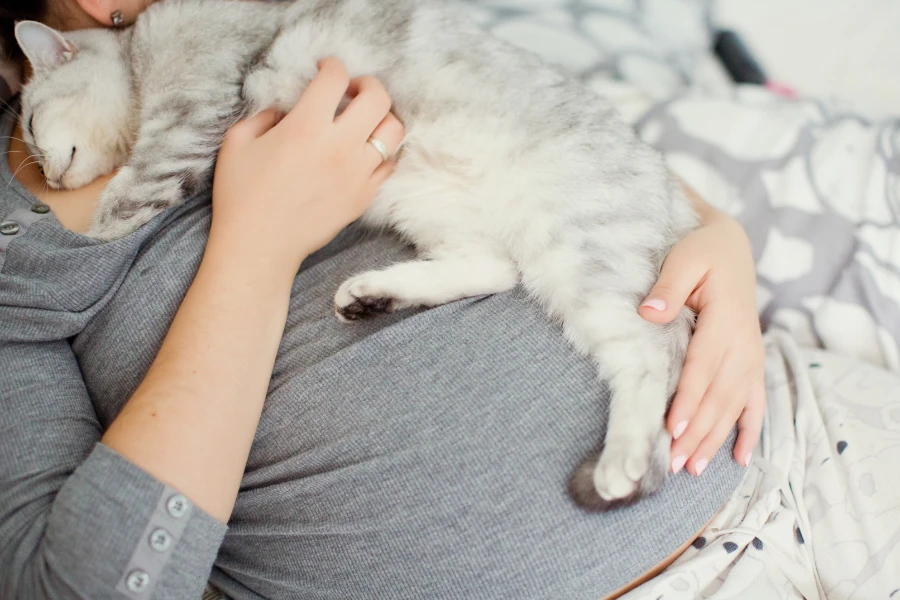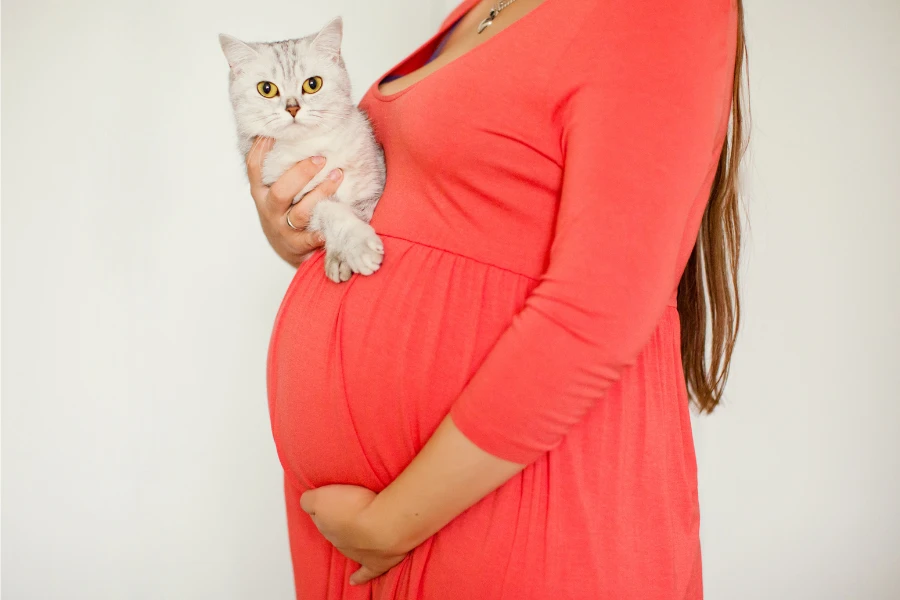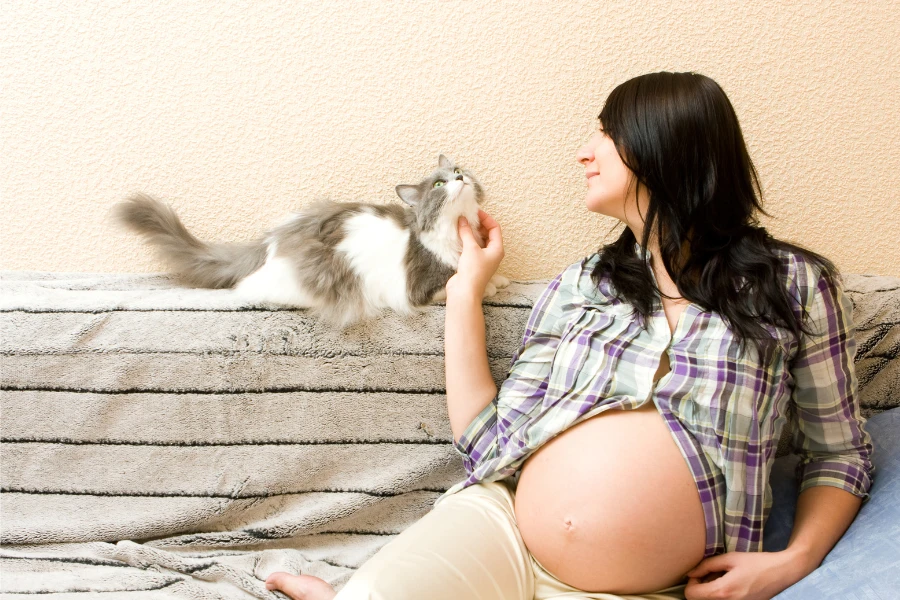Pregnant women often have to worry about their safety and unborn babies, and one unexpected threat may come from cats. While it is not always the case, sometimes cats can become aggressive towards pregnant women due to perceptions of changes in scent or behavior caused by hormonal shifts during pregnancy.
It’s important for expecting mothers and their cats to take precautions in creating a safe space for both themselves and their pets. In this blog post, we look at the reasons why cats attack pregnant women so that readers can be proactive in preventing any harm coming to either party.
Key Takeaways
- Cats take on a protective instinct when they sense changes in the scent or behavior of pregnant women due to hormonal shifts during pregnancy.
- Salient signs of cat aggression include physical, behavioral, and vocal cues such as defensive postures, hissing noises, dilated pupils, and frequent yowling.
- Training and socializing cats properly are essential for preventing attacks toward their owners and creating safe spaces where cats can retreat in distress.
- Supervising interactions between the expecting mother and pet is key to reducing risks associated with cat attacks while pregnant.
Understanding The Reasons Behind Cat Attacks On Pregnant Women
Cats may become aggressive towards pregnant women for various reasons, such as fear, territorial protection, or a dislike for hormonal changes.

Protective Instincts Of Cats
Cats are known for their territorial behavior, so it is no wonder they can become aggressive when a new individual enters the domestic space. Cats instinctively need to keep anything considered part of their territory safe from intruders, including unborn babies in pregnant women.
An expecting mother’s scent may be enough for cats to feel threatened by the potential change in ownership or territory and lash out. This behavior is also seen in various big cats, especially those with young cubs; mothers will often protect them at all costs if they perceive any threat.
Cats have been thought to have inherited this protective instinct from wild ancestors over time through evolution.
This can pose a risk to both mother and baby as cat attacks can lead to scratches which open the door to infection if not appropriately treated afterward – something that should be kept in mind when owning or dealing with any pet during pregnancy.
Therefore, ameliorating potential aggression before it happens is advised for expectant mothers who own cats or are regularly around them; this includes training your cat early on, socializing him/her frequently around other humans and animals, as well as keeping undesired interaction such as growing too close supervised until trust has been established between owner and pet.
Changes In Scent Or Behavior Of Pregnant Women
Pregnant women may experience physical, emotional, and behavioral changes throughout their pregnancy. Hormones can trigger subtle scent changes that cats are very attuned to, which could be interpreted as a change in the relationship or dynamic between the cat and the pregnant woman.
Additionally, pregnant women may make structural changes to prepare for their baby or due to morning sickness, causing them to alter their daily routine or dietary habits – all of which can cause uncertainty for cats who prefer familiarity and predictability.
Cats’ natural territorial instinct may also kick in when they sense a usurper – even if it’s an unborn one.
Fear Or Anxiety In Cats
Fear and anxiety in cats are common causes of aggression, particularly towards pregnant women. Cats are creatures of consistency that may become scared or agitated by sudden changes in their environment or their owner’s behavior.
For example, when a woman becomes pregnant, her scent and activities can change significantly, which can be frightening for cats that may already be feeling anxious. Cats that have been neglected or haven’t had enough exposure to humans from a young age can also exhibit aggressive behavior due to fear or insecurity.
Cat owners must recognize signs of fear-based aggression, such as pacing, dilated pupils, flattened ears, hissing, and growling. If your cat exhibits these behaviors, it’s best to consult with a veterinarian or an animal behaviorist so they can diagnose the underlying cause and develop strategies for addressing the issues before they escalate into attacks on people, including expecting mothers.

Signs Of Cat Aggression During Pregnancy
Pregnant women can identify cat aggression by monitoring physical, behavioral, and vocal cues such as hissing noises, defensive posturing with back arched, tail fluffed up or puffed out, and direct stares.
Physical Cues
Cats may become aggressive towards pregnant women, and the physical cues associated with this aggression are important to recognize. When triggered by a sudden change, such as their owner’s pregnancy, cats can exhibit defensive postures — standing with an arched back, their hairs held erect, and ears flattened backward on their head or tail held erect.
Loud growling or hissing can also be a signal of aggression in cats. Fearful cats may also display redirected aggression; they may bite at a nearby hand in response to sudden noise or new odor, which they perceive as threatening.
Behavioral Cues
Cats are sensitive creatures and can become aggressive when they feel threatened. While cats may exhibit outward signs of aggression like hissing or growling, they may also show subtle body language cues to alert the pregnant woman that an attack is imminent.
Common behavioral responses include dilated pupils, licking their lips, tail twitching, and rapid lash movements. Even with slow movement and relatively silent behaviors, such as standing tall with fur on their back, cats can indicate intense agitation before progressing towards physical violence toward a pregnant owner.
These symptoms should be taken seriously. One should not attempt to come near it until proper safety measures have been taken, such as calming down the cat by talking softly to it to reduce any potential risks of being attacked during pregnancy.
Vocal Cues
Cats may exhibit a range of vocalizations when feeling uncertain, threatened, or agitated, which can signify that your cat may become aggressive toward you if you’re pregnant.
Hissing, growling, snarling, and spitting are all common warning signs among cats that should not be ignored. Frequent yowling may also indicate fear or anxiety in the animal, and owners need to monitor their pet’s behavior and take any necessary precautions to prevent potentially dangerous situations.
To better understand the meaning behind these cues, cats meowing excessively out of concern for their owner’s safety could be interpreted as an aggressive reaction. Furthermore, loud squalling sounds or short yelps combined with darting movements from one place to another could mean your cat feels threatened by someone who has entered its territory.
In this case, it might also be wise for expectant mothers to keep their distance if possible, as arousal in cats can escalate quickly, leading them into attack mode.
It is also important to remember that even friendly felines, like most other pets, do not necessarily react positively when they sense sudden changes around them – especially during sensitive periods like pregnancy, which brings shifts in smells and hormones along with increased levels of stress (for both parties).

Preventing Cat Attacks During Pregnancy
Training and socializing the pet early on is essential to reduce the chances of a cat attacking its pregnant owner and creating safe spaces for the cat to retreat to in times of distress.
Training And Socializing Your Cat
Training and socializing cats can be a great way to prevent cat attacks during pregnancy. Proper training should involve giving your cat positive reinforcement for desired behaviors, such as petting or treats when they are behaving well.
Training sessions should begin early in your cat’s life and continue throughout their lifetime. Consistency is important, so it’s best to stick with one particular technique rather than switching back and forth between different ones.
Not only will this help reduce aggression towards pregnant women, but it also puts your cat at ease around other people or animals that may contact them while you’re away from home.
Socialization training requires slow exposure to various objects and activities that a cat may experience daily, like guests visiting the house, playing loud music, or bringing out the vacuum cleaner, for example.
This allows the cat to become less fearful because he has been gradually introduced to these things before experiencing them all at once, which could potentially trigger aggressive behavior towards any strangers, including pregnant women who haven’t been properly trained on how to approach him first before getting close enough to touch him.
Creating Safe Spaces For Your Cat
When pregnant, creating a safe and secure environment for your cat is essential to help prevent any potential attacks. This includes providing adequate hiding spots and creating calming, relaxed areas where your cat can retreat.
Cat trees are incredibly useful for this purpose, as cats love climbing higher up and watching their surroundings from above. Hiding spots — like cardboard boxes with holes cut out — can provide security and comfort when anxious or scared.
Additionally, you could try using calming pheromone sprays in peaceful parts of the home, which release natural “happy” hormones that help reduce anxiety in cats.
Supervising Interactions Between Cat And Pregnant Woman
Cat owners must pay particular attention when a pregnant woman is interacting with their pet. The unpredictability of cats’ responses and behaviors can lead to circumstances in which the expectant mother may be at risk of being scratched, bitten, or attacked by the animal.
This could cause serious harm not just to the pregnant woman but also to her unborn baby.
To safely supervise interactions between dogs and pregnant women, creating dedicated safe spaces with minimal distractions should become part of the everyday routine for both owner and pet.
Activities such as cuddling on sofas, chairs, or beds can often trigger unfamiliar reactions from cats, which can result in aggression; instead, designated playtime (such as chasing lasers or playing fetch) should take place securely away from furniture in an area where they feel comfortable while still being overseen.

Consultation With A Veterinarian Or Behaviorist
Cat aggression towards expectant owners should not be taken lightly. No matter how docile and harmless a pet cat may appear in its everyday routine, it is important to take preventive measures to ensure the safety of the pregnant woman and her pet.
Consulting with a veterinarian or animal behaviorist before and during pregnancy can help identify any potential aggressive behavior that cats might exhibit due to changes in hormones or routine.
These professionals are best equipped to recognize signs of any underlying stress or anxiety your cat experiences near you—key indicators that could lead to aggression when neglected.
Through training and socializing, they can also guide you on how best to ensure an unbothered environment around your feline friend while providing tips on maximizing positive reinforcement through rewards-based methods such as playtime and treats.
Dealing With Cat Attacks During Pregnancy
Perhaps the most important thing a pregnant woman who owns a cat can do is not handle the cat herself and seek professional help. Cat owners should, as soon as they are aware of their pregnancy, consult with either their veterinarian or an animal behaviorist about available options for managing their cat during this time; this includes making sure the cat has been properly trained and socialized.
It’s also essential for expecting mothers around cats to take precautions so attacks can be avoided moving forward.
Conclusion
The subject of cats attacking pregnant women is serious, and it is important to recognize the various reasons cats may become aggressive toward pregnant owners.
Understanding the warning signs and taking preventive measures such as proper training, socialization, supervision, and consultation with professionals can go a long way in protecting both you and your feline family member during this time.
Remember that if bitten by a cat while pregnant, medical attention should be sought immediately to avoid complications.
